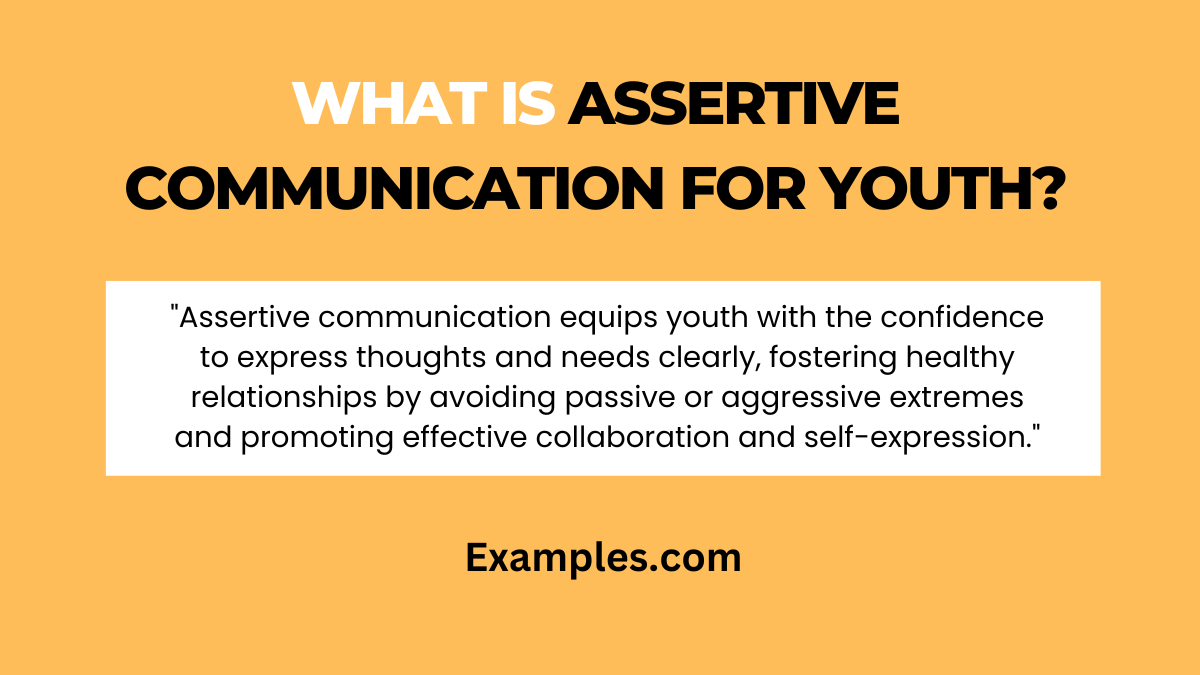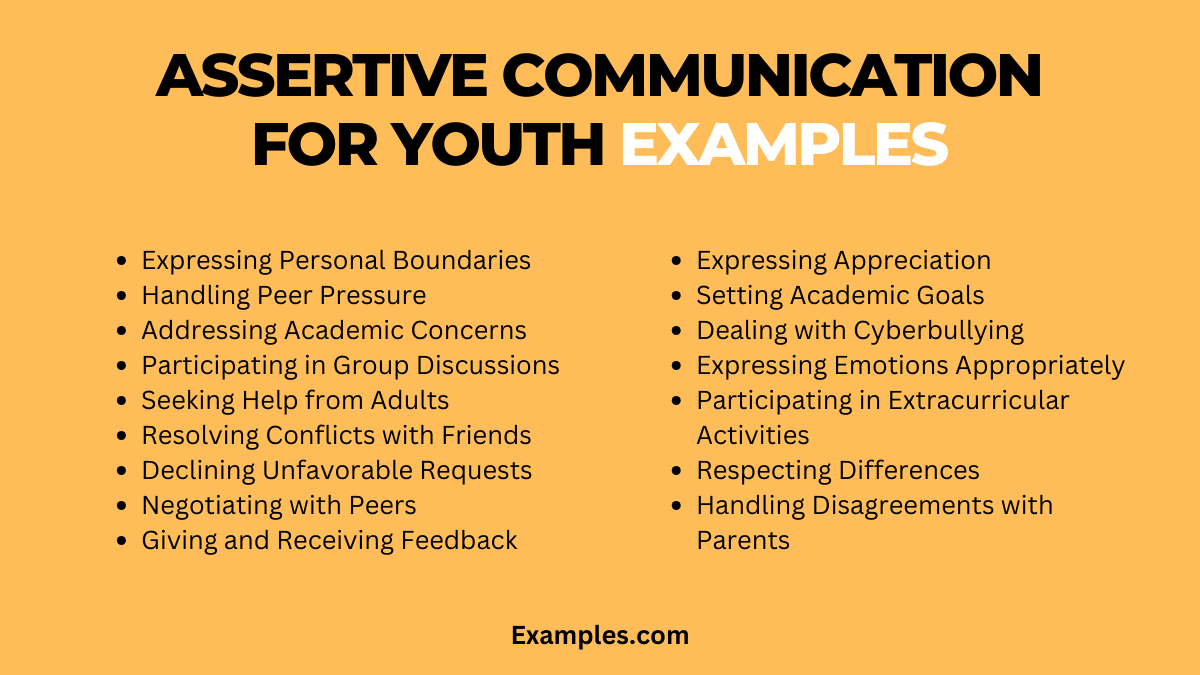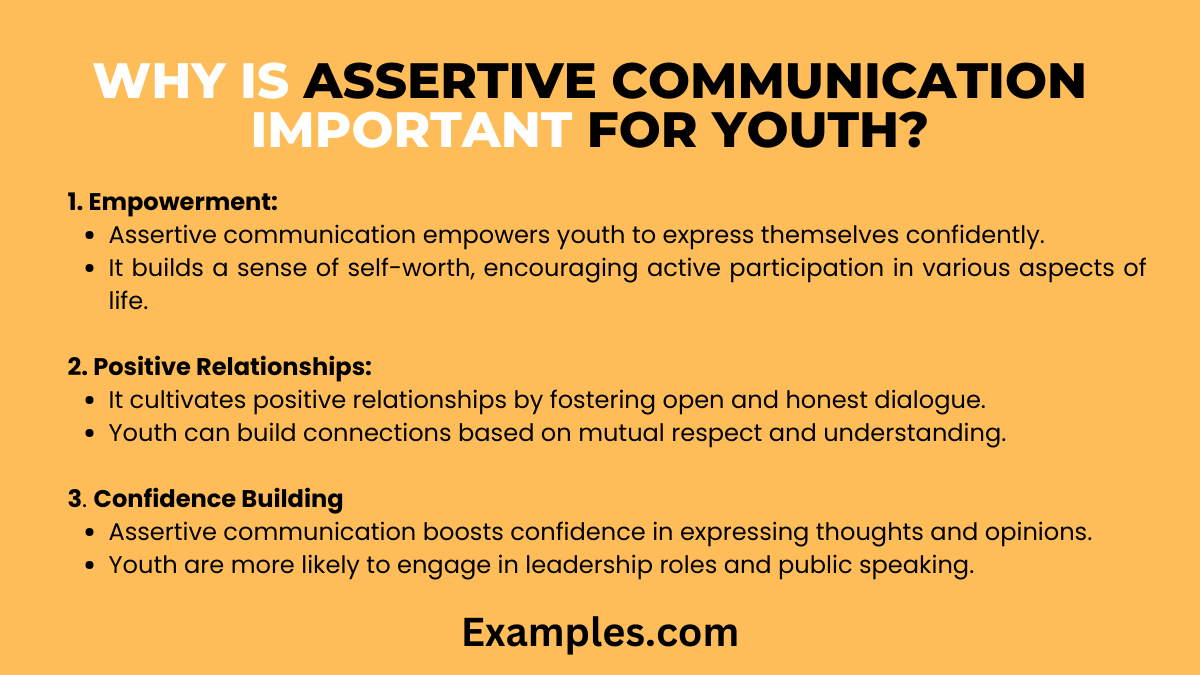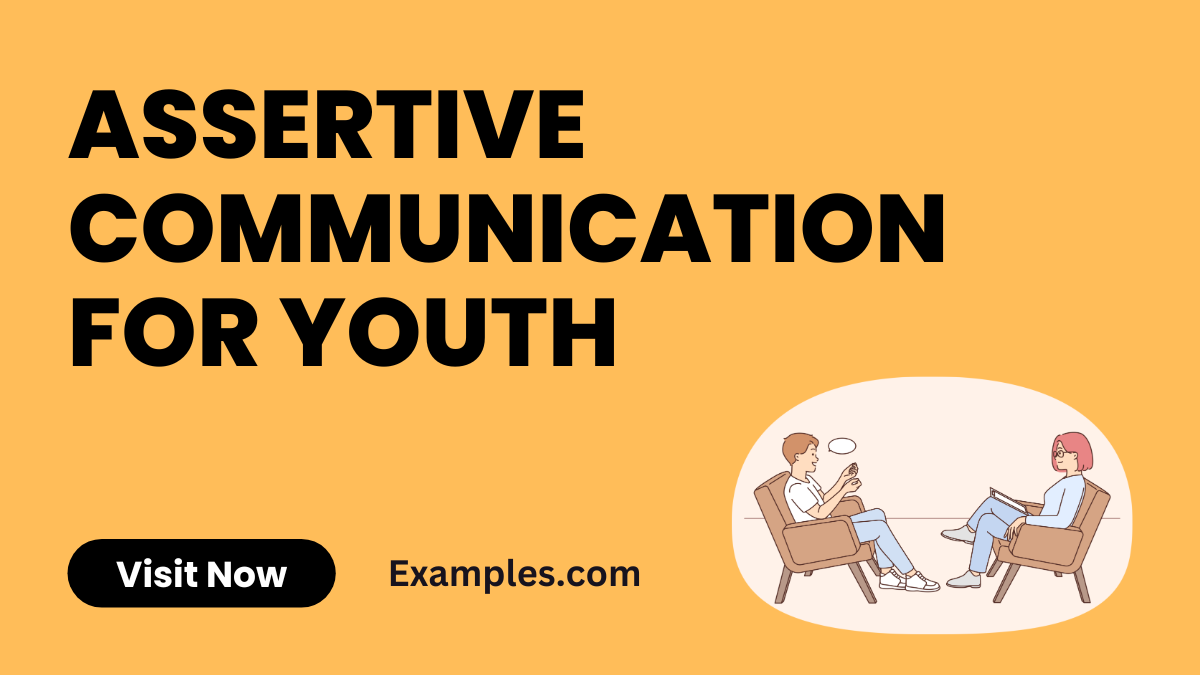19+ Assertive Communication For Youth Examples
Empowering the youth with effective communication skills is pivotal for personal growth and success. This comprehensive guide delves into Assertive Communication, equipping young individuals with the tools to express themselves confidently and navigate various scenarios. Learn through practical Communication Examples tailored for youth, fostering leadership, and enhancing interpersonal connections. Discover the art of assertiveness, boost self-esteem, and embark on a journey of effective communication tailored for the vibrant energy of the youth.
What is Assertive Communication for Youth?

In the dynamic realm of youth interactions, Assertive Communication is a vital skill that enables individuals to express thoughts, needs, and opinions clearly and respectfully. This communication style empowers young people to navigate interpersonal relationships with confidence, avoiding the pitfalls of passive or aggressive approaches. Assertive communication fosters open dialogue and understanding, allowing youth to strike a balance between valuing their perspectives and acknowledging those of others. Embracing this approach cultivates effective collaboration, enhances self-expression, and contributes to the overall growth and success of the youth.
20 Assertive Communication for Youth Examples

Unlock the potential of youth with these Assertive Communication examples tailored for growth and success.
- Expressing Personal Boundaries: Clearly communicate limits to peers, ensuring respectful interactions and maintaining personal space.
- Handling Peer Pressure: Assertively say “no” to unwanted influences, expressing individual choices confidently.
- Addressing Academic Concerns: Communicate with teachers about challenges, seeking support and clarifications with confidence.
- Participating in Group Discussions: Boldly share opinions in group settings, contributing to collaborative learning experiences.
- Seeking Help from Adults: Confidently ask for guidance from mentors, fostering positive relationships and mentorship.
- Resolving Conflicts with Friends: Address conflicts openly, expressing feelings and seeking resolution respectfully.
- Declining Unfavorable Requests: Politely refuse requests that go against personal values, maintaining integrity and self-respect.
- Negotiating with Peers: Assertively negotiate solutions in group projects, ensuring fair contributions and success.
- Giving and Receiving Feedback: Communicate constructive feedback with tact, fostering a culture of continuous improvement.
- Expressing Appreciation: Boldly show gratitude to peers and mentors, building positive relationships.
- Setting Academic Goals: Clearly communicate academic aspirations, seeking support and encouragement from teachers.
- Dealing with Cyberbullying: Assertively address online harassment, reporting incidents and seeking support from trusted adults.
- Expressing Emotions Appropriately: Communicate feelings openly, fostering emotional intelligence and connection.
- Participating in Extracurricular Activities: Boldly join clubs and activities, showcasing leadership and teamwork skills.
- Respecting Differences: Assertively embrace diversity, respecting and celebrating differences among peers.
- Contributing Ideas in Class: Confidently share innovative ideas during class discussions, contributing to a dynamic learning environment.
- Handling Disagreements with Parents: Address disagreements respectfully, expressing opinions while maintaining familial harmony.
- Seeking Internship Opportunities: Assertively apply for internships, showcasing ambition and a desire for experiential learning.
- Clarifying Misunderstandings: Address misunderstandings promptly, preventing potential conflicts and fostering clear communication.
- Engaging in Youth Advocacy: Boldly speak out on issues that matter, becoming a voice for positive change in the community.
Empower the youth with these real-world examples, cultivating assertive communication skills for a successful and confident future.
Assertive Communication for Youth in Business Examples
Empower young entrepreneurs with assertive communication skills crucial for success in the business world. Explore real-world examples tailored for the youth navigating the dynamic landscape of entrepreneurship.
- Pitching Innovative Ideas to Investors: Assertively present groundbreaking business concepts, showcasing confidence and passion for entrepreneurial success.
- Negotiating Business Partnerships: Boldly negotiate terms with potential partners, ensuring mutually beneficial collaborations and fair agreements.
- Handling Client Feedback Professionally: Confidently address client feedback, turning constructive criticism into opportunities for service improvement.
- Expressing Leadership in Team Projects: Communicate leadership aspirations within a team, encouraging collaboration and showcasing initiative.
- Navigating Networking Events with Confidence: Assertively engage in networking, introducing oneself and making meaningful connections with industry professionals.
- Addressing Workplace Challenges: Boldly communicate challenges in the workplace, seeking innovative solutions and contributing to a positive work environment.
- Seeking Mentorship from Experienced Professionals: Confidently approach experienced mentors, expressing a desire for guidance and knowledge in the business realm.
- Presenting Financial Reports Clearly: Assertively present financial data, ensuring stakeholders have a clear understanding of the business’s financial health.
- Clarifying Job Responsibilities: Boldly seek clarification on job roles and expectations, ensuring alignment with career goals and organizational success.
- Initiating Collaborative Projects: Confidently propose collaborative projects, showcasing an entrepreneurial spirit and fostering a culture of innovation.
Assertive Communication for Youth at Workplace Examples
Navigate the professional landscape with assertive communication skills tailored for the youth in a workplace setting. Discover examples that empower young professionals to thrive in diverse work environments.
- Expressing Career Aspirations to Supervisors: Boldly communicate career goals to supervisors, seeking guidance on potential growth opportunities within the organization.
- Negotiating Salary Expectations: Assertively negotiate salary expectations during job interviews, ensuring fair compensation for skills and contributions.
- Providing Constructive Feedback to Peers: Confidently offer constructive feedback to colleagues, contributing to a culture of continuous improvement and collaboration.
- Navigating Remote Work Expectations: Boldly discuss remote work expectations with employers, ensuring a balanced and productive work-from-home experience.
- Addressing Workplace Microaggressions: Confidently address and educate peers on microaggressions, fostering a respectful and inclusive workplace culture.
- Handling Conflicting Priorities with Teammates: Assertively communicate conflicting priorities within a team, seeking solutions to ensure efficient workflow.
- Initiating Inclusive Practices in Team Activities: Boldly propose inclusive practices in team activities, ensuring all members feel valued and heard.
- Expressing Mental Health Needs to Managers: Confidently communicate mental health needs to managers, promoting workplace well-being and understanding.
- Clarifying Expectations in New Roles: Assertively seek clarity on expectations in new roles, ensuring a smooth transition and alignment with organizational goals.
- Proposing Flexible Work Arrangements: Boldly propose flexible work arrangements when needed, showcasing adaptability and a focus on work-life balance.
How Do You Develop Assertive Communication for Youth?
Developing assertive communication skills for youth involves a purposeful and empowering journey. Begin by fostering self-awareness, encouraging expression, and providing practical experiences. Here’s a step-by-step guide:
- Self-Reflection:
- Encourage youth to reflect on their values, needs, and opinions.
- Promote self-awareness to understand personal communication styles and preferences.
- Role-Playing Exercises:
- Engage in interactive role-playing scenarios that simulate real-life communication challenges.
- Provide constructive feedback to help youth refine their assertive communication techniques.
- Communication Workshops:
- Organize workshops that focus on assertiveness, addressing specific youth-related scenarios.
- Include interactive activities to reinforce skills and build confidence.
- Positive Reinforcement:
- Acknowledge and celebrate instances of assertive communication.
- Foster a supportive environment that encourages continuous improvement.
- Mentorship Programs:
- Pair youth with mentors who exemplify assertive communication.
- Facilitate open communication channels between mentors and mentees.
- Encourage Expressive Arts:
- Explore activities like drama, art, or public speaking to enhance expressive communication.
- Develop creative platforms where youth can express themselves confidently.
- Real-world Experiences:
- Provide opportunities for youth to engage in real-world scenarios.
- Encourage participation in community projects, internships, or leadership roles.
- Feedback Mechanism:
- Establish a constructive feedback mechanism for ongoing improvement.
- Encourage peers and mentors to provide feedback on communication styles.
- Promote Emotional Intelligence:
- Emphasize the importance of understanding and managing emotions.
- Develop activities that enhance emotional intelligence in communication.
- Cultivate Active Listening:
- Teach the significance of active listening in assertive communication.
- Provide guidance on validating others’ perspectives while expressing one’s own.
Why Is Assertive Communication Important for Youth?

Assertive communication plays a pivotal role in the development and success of youth, fostering personal and professional growth. Here’s why it’s crucial:
- Empowerment:
- Assertive communication empowers youth to express themselves confidently.
- It builds a sense of self-worth, encouraging active participation in various aspects of life.
- Positive Relationships:
- It cultivates positive relationships by fostering open and honest dialogue.
- Youth can build connections based on mutual respect and understanding.
- Confidence Building:
- Assertive communication boosts confidence in expressing thoughts and opinions.
- Youth are more likely to engage in leadership roles and public speaking.
- Conflict Resolution:
- It equips youth with skills to address conflicts effectively.
- By expressing needs and boundaries clearly, conflicts can be navigated constructively.
- Career Advancement:
- In professional settings, assertive communication is essential for career growth.
- Youth who can articulate their ideas are better positioned for success.
- Personal Development:
- It contributes to overall personal development and self-discovery.
- Youth learn to navigate challenges, make informed decisions, and set healthy boundaries.
- Academic Success:
- In educational settings, assertive communication aids in academic success.
- It facilitates effective collaboration, group work, and engagement in classroom discussions.
- Adaptability:
- Assertive communication prepares youth for diverse social and professional environments.
- They learn to adapt their communication style based on different contexts.
- Stress Reduction:
- By expressing needs and concerns assertively, youth can reduce stress.
- It creates a sense of control and understanding in challenging situations.
- Leadership Skills:
- Assertive communication is a foundational skill for leadership.
- Youth who master assertiveness are more likely to inspire and influence others positively.
Tips for Effective Assertive Communication for Youth?
Empower the youth with these practical tips for mastering assertive communication in various aspects of their lives:
- Use “I” Statements:
- Encourage youth to express feelings and needs using “I” statements.
- For example, “I feel confident in presenting my ideas during team discussions.”
- Practice Active Listening:
- Emphasize the importance of attentive listening in assertive communication.
- For instance, “I am actively listening to your perspective and value your input.”
- Maintain Eye Contact:
- Teach the significance of maintaining eye contact for confident communication.
- Practice with statements like “I maintain eye contact to convey sincerity and confidence.”
- Set Clear Boundaries:
- Guide youth in setting and communicating personal boundaries.
- An example could be “I communicate my boundaries clearly to maintain a healthy balance.”
- Use Positive Body Language:
- Highlight the role of positive body language in assertive communication.
- Encourage statements like “I use positive body language to enhance the impact of my message.”
- Seek Clarification:
- Instruct youth to seek clarification when unsure, promoting clear communication.
- Encourage phrases like “I seek clarification to ensure mutual understanding.”
- Practice Assertive Posture:
- Teach the importance of confident posture in assertive communication.
- For example, “I adopt assertive posture to convey confidence and self-assurance.”
- Express Needs Clearly:
- Guide youth in expressing their needs and desires clearly and directly.
- Encourage statements like “I express my needs clearly for effective collaboration.”
- Emphasize Calmness in Conflict:
- In conflict situations, stress the importance of maintaining calmness.
- For instance, “I stay calm during conflicts to find constructive resolutions.”
- Encourage Self-Advocacy:
- Foster a sense of self-advocacy by encouraging youth to speak up for themselves.
- Promote statements like “I advocate for myself to ensure my needs are acknowledged.”
In conclusion, assertive communication is an invaluable tool for youth, fostering their growth and success in various realms of life. By mastering this skill, young individuals are equipped to confidently articulate their thoughts, establish positive relationships, and navigate diverse situations with ease. It’s crucial to understand that assertiveness is not just about being heard but also about respecting others’ viewpoints. This balance promotes a culture of mutual respect and understanding, paving the way for successful collaborations and personal development.



